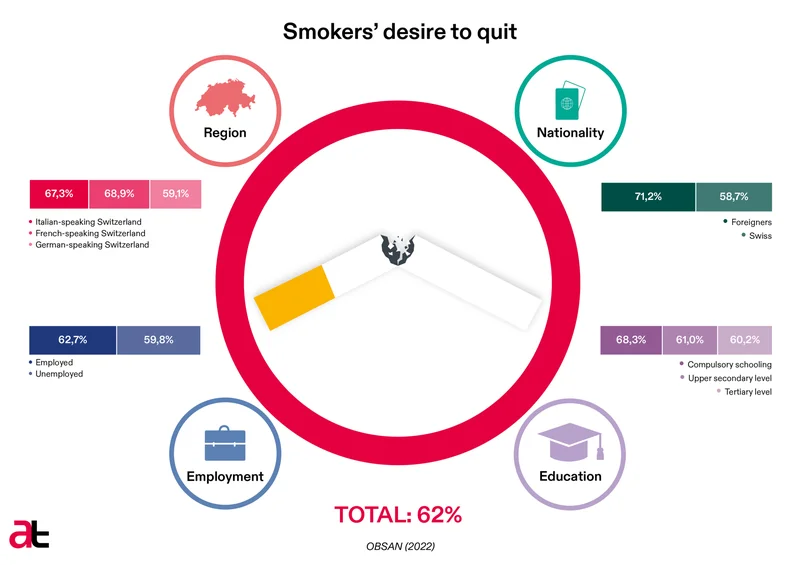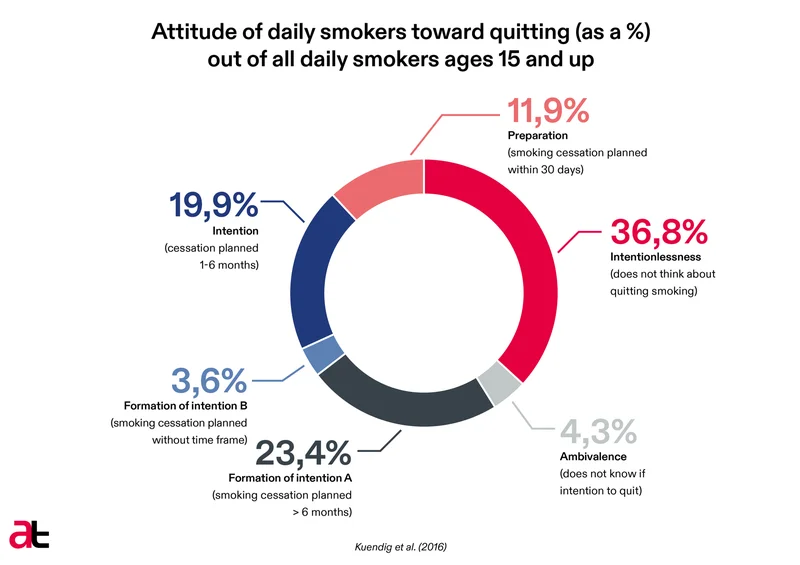Quitting smoking
- Almost two-thirds – 62.0% – of smokers want to stop smoking.
- In terms of whether or not a person wants to stop smoking, fairly significant differences exist among language regions and as a function of nationality and educational level.
- Over the course of a year, one person out of six who tries to stop smoking succeeds.
- Only about two daily smokers out of 10 – 19.1% – succeed at stopping smoking on their first attempt.
Smoking cessation is obviously a contributing factor to the epidemiology of smoking behaviour in a population (i.e. it leads to a reduction in the prevalence of smoking if the number of people starting to smoke is not greater than the number quitting). Quitting smoking also contributes to an individual’s reduction in the short-, medium-, and long-term risk of developing health consequences (see also our page Benefits of smoking cessation).
The desire to stop smoking
In the 2017 Swiss health survey (ESS - Enquête suisse sur la santé), 62.0% of smokers reported wanting to stop smoking (Figure A4A-1; OBSAN, 2021[1]). More than a quarter of smokers – 28% – reported having made a serious attempt in the preceding 12 months (with a relapse at least two weeks later; OFS, 2020[2]). These same data reveal that over the course of a year, one person out of six who attempted to stop smoking appears to have succeeded. Out of the population as a whole, it is estimated that almost half of the people who smoked at one time were able to stop (44%; the proportion of former smokers out of all those who reported having smoked).

Figure A4A-1 – Smokers’ desire to quit, overall, by language region, nationality, educational level, and employment status, ESS 2017 (Source OBSAN, 2022[3]).
In 2017, the proportion of smokers expressing a desire to quit nevertheless varied noticeably according to language region (French-speaking and Italian-speaking smokers > German-speaking), as a function of nationality (other nationalities > Swiss), and of educational level (required level of education only > secondary education or higher).
The attitude of smokers toward quitting does not appear to have changed greatly since the early 2000s (OBSAN, 2021[4]).
The proportion of smokers wishing to reduce their consumption
Data in relation to the motivation to quit smoking were also collected in the Omnibus “Santé et lifestyle”[5] study, an on-line survey conducted in 2018 by the Federal Statistical Office (FSO) for the Federal Office of Public Health (FOPH). In this survey, 59.1% of smokers reported wanting to quit. Here again, the aforementioned differences among language regions and educational levels were observed. It should be noted that this survey also asked daily smokers about their desire to quit. In all, almost three-quarters – 73.5% – of daily smokers reported this.
Attitude of daily smokers toward quitting
The Swiss Addiction Monitoring (Monitorage suisse des addictions), which was active up until 2016, furnished detailed documentation about the question of quitting in reports focusing on this topic (latest data collected in 2015; Kurendig et al., 2016[6]). It showed that six daily smokers out of 10 – 60.1% – reported wanting to quit smoking (and over a third of occasional smokers – 37.2% – reported this).
Incidentally, looking at a breakdown that distinguishes among smokers as a function of their attitude toward quitting (Prochaska et al., 1992[7]), it is estimated that while 36.8% of daily smokers were in the so-called denial stage (no reported desire to quit; Figure A4A-2), no fewer than 19.9% were in the contemplation stage (planning to try to quit in the coming one to six months) and 11.9% were in the preparation stage (planning to quit in the following 30 days). The proportion of smokers in the preparation stage was slightly higher in the 25 to 34-year-old age group (14.6%) and the 35 to 44-year-old group (14.5%) and lower among 20 to 24-year-olds (8.0%).

Figure A4A-2 – Attitude of daily smokers toward quitting (as a %) out of all daily smokers ages 15 and up, CoRolAR 2015 (Source: Kuendig et al., 2016[8]).
Successful attempts to quit
When it comes to actually stopping smoking, and thus successful attempts to quit, the same report reveals that eight ex-smokers out of 10 – 80.1% – had made several attempts before finally succeeding (Kuendig et al., 2016[9]). In addition, the most frequently cited reasons given by non-smokers for quitting were clearly related to health: 33.4% mentioned “to prevent illness” and 16.1% cited “becoming aware of the impact of smoking on health” (former occasional smokers, on the other hand, mostly mentioned both the prevention of illness and the “loss of enjoyment of smoking”). It should also be noted that in this study, more than three-quarters – 76.3% – of former daily smokers reported not having used any quitting aid when they stopped.
[1] https://ind.obsan.admin.ch/fr/indicator/monam/disposition-a-arrter-de-fumer-age-15; accessed 12.02.2022.
[2] OFS (2020) : Actualité OFS - Enquête suisse sur la santé 2017 – Consommation de tabac en suisse. OFS. Neuchâtel. Download.
[3] https://ind.obsan.admin.ch/fr/indicator/monam/disposition-a-arrter-de-fumer-age-15; accessed 12.02.2022.
[4] https://ind.obsan.admin.ch/fr/indicator/monam/disposition-a-arrter-de-fumer-age-15; accessed 12.02.2022.
[5] https://www.bag.admin.ch/bag/fr/home/das-bag/ressortforschung-evaluation/forschung-im-bag/forschung-nichtuebertragbare-krankheiten/monitoring-systemncd/erhebung-gesundheit-lifestyle.html; accessed 10.02.2022.
[6] Kuendig, Hervé ; Notari, Luca ; Gmel, Gerhard (2016) : Désaccoutumance tabagique en Suisse en 2015 - Analyse des données du Monitorage suisse des addictions. Addiction Suisse. Lausanne. Download.
[7] Prochaska, James O; DiClemente, Carlo C; Norcross, John C. In search of how people change. Applications to addictive behaviors. American Psychologist. 1992 47;9: 1102-1114.
[8] Kuendig, Hervé ; Notari, Luca ; Gmel, Gerhard (2016) : Désaccoutumance tabagique en Suisse en 2015 - Analyse des données du Monitorage suisse des addictions. Addiction Suisse. Lausanne. Download.
[9] Kuendig, Hervé ; Notari, Luca ; Gmel, Gerhard (2016) : Désaccoutumance tabagique en Suisse en 2015 - Analyse des données du Monitorage suisse des addictions. Addiction Suisse. Lausanne. Download.
AT Switzerland, September 2022